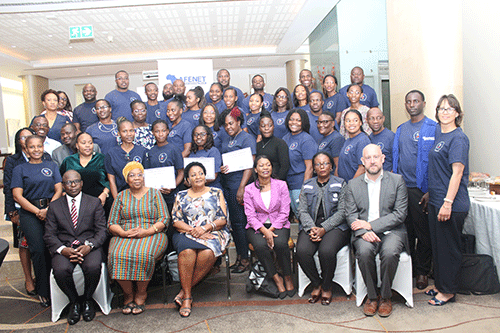Forced by the many public health emergencies facing the world, the health ministry and its development partners continue to train frontline workers to equip them with the knowledge to respond to epidemics promptly.
Speaking during the Namibia Field Epidemiology and Laboratory Training Programme (FELTP) Frontline Cohort VII Graduation last week, deputy health minister Esther Utjiua Muinjangue said the Covid-19 pandemic has taught them the importance of having well-equipped ‘disease detectives’ on the ground, especially at a local level.
“Disease detectives are the catalyst of the impacts any disease outbreak can pose; be it effects on the health system or socio-economy. The knowledge and skills this training offers are needed now more than ever as we continue responding to Covid-19 and other emerging and re-emerging disease outbreaks,” she noted.
Also called disease detectives, epidemiologists search for the cause of a disease, identify people who are at risk, and determine how to control or stop the spread or prevent it from happening again. Physicians, veterinarians, scientists and other health professionals often train to be “Disease Detectives”.
The graduation saw more than 20 medical practitioners from various institutions across the country coming together to share studies and health-related information that they have been collating after undergoing three months of intensive training.
This year, the NamFELTP celebrated its 10th anniversary since the first frontline training held in August 2012.
Muinjangue stated that frontline training aims to enhance knowledge and develop competencies and skills for cadres at facilities and district level to strengthen public health interventions such as disease surveillance, outbreak investigations and response, including data management focusing on data quality audits.
“Going forward, I would want to see tangible improvements in the way we handle issues of outbreaks,” she urged.
For the past few years, the World Health Organisation (WHO) has recorded numerous public health emergencies globally, and NamFELTP alumni and residents have been at the helm of responding to these outbreaks locally.
WHO country representative Charles Sagoe-Moses said the graduation comes at the right time when Namibia is in the initial stages of rolling out the Emergency Preparedness and Response flagship initiative that aims to strengthen the country’s capacity to prepare for, detect and respond to emergencies with public health consequences.
“The NamFELTP continues to help member states achieve stronger and more resilient health systems that are prepared and able to respond to outbreaks and other public health emergencies. It is evident that the Field Epidemiology Training Programme fellows and graduates have played, and continue to do so, a central role in the response to the Covid-19 pandemic and other public health emergencies in Namibia,” he added.


